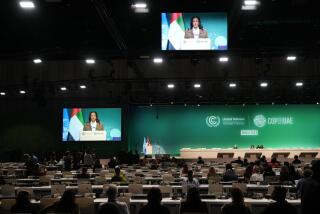‘Iraq’s Looking Good,’ Cheney Tells U.S. Troops
- Share via
BAGHDAD — Vice President Dick Cheney paid a surprise visit to Iraq on Sunday, declaring that the United States had “turned the corner” in efforts to pacify the country. His stopover came as insurgents renewed their attacks after a lull for last week’s election and freed a kidnapped German archeologist.
The visit was the vice president’s first since the U.S.-led invasion that ousted President Saddam Hussein in April 2003. He received a briefing about Thursday’s election from Gen. John P. Abizaid, head of U.S. Central Command; Gen. George W. Casey, commander of U.S. forces in Iraq; and U.S. Ambassador Zalmay Khalilzad. Then he met separately with Iraqi President Jalal Talabani and Prime Minister Ibrahim Jafari at the U.S. Embassy in Baghdad’s fortified Green Zone.
Talabani called Cheney a “hero of liberating Iraq.”
The nine-hour visit had been kept under wraps for security reasons. Even Jafari expressed surprise when he showed up for what he thought was a meeting with the ambassador.
Cheney also spoke to U.S. troops and inspected Iraqi forces being trained to take over the fight against insurgents.
During an exchange with the vice president, Marine Cpl. Bradley Warren said: “From our perspective, we don’t see much as far as gains” in the war. “I was wondering what it looks like from the big side of the mountain, how Iraq’s looking.”
“Well, Iraq’s looking good,” Cheney replied. “We’ve turned the corner. I think when we look back from 10 years hence, we’ll see that the year ’05 was in fact a watershed year here in Iraq.”
The resurgence of violence Sunday was aimed mostly at Iraqi security forces. At least nine people were reported killed.
In the northern city of Kirkuk, gunmen killed a police officer and his son in their house, according to Iraqi officials.
Police officers were also targeted in Baghdad throughout the day. A roadside bomb exploded near a Baghdad university, killing two officers. Later, in the Jamiya neighborhood, gunmen ambushed a police patrol, injuring 11 people. Officials at Yarmouk Hospital in Baghdad said they received the bodies of three police officials, killed in separate incidents, as well as the remains of a suicide bomber whose explosives had apparently detonated before he reached his target.
Drive-by gunmen killed the chauffeur for a Baghdad prison director in the Habibiya neighborhood, and a bomb exploded in a crowded market near the main Shiite Muslim shrine in the Kadhimiya district of the capital, killing one woman and injuring 15 other people.
But on a more hopeful note, German officials announced the release of a hostage held in Iraq since late last month.
“I’m pleased to announce today, also on behalf of the German chancellor, that Mrs. Susanne Osthoff is no longer in the hands of the kidnappers. She is in the safe care of the German Embassy in Baghdad,” Foreign Minister Frank-Walter Steinmeier said at a news conference in Germany on Sunday, according to Associated Press.
Osthoff and her Iraqi driver disappeared Nov. 25 while traveling in northern Iraq. Steinmeier offered no details. The status of her driver was not immediately known.
Attacks by the Sunni Arab-led insurgency had diminished sharply last Thursday as Iraqis voted in the country’s most competitive election in decades, choosing a full-term four-year parliament. Sunni Muslims, who had boycotted the election of an interim government in January, turned out in force. About 70% of eligible voters came to the polls, Jafari said.
“The participation levels all across the country have been remarkable,” Cheney told reporters traveling with him. “That’s exactly what needs to happen to build a political structure, a self-governing Iraq that’s unified various segments of the population and ultimately takes over responsibility for its own security.”
Although no official returns are expected until next week, the coalition of Shiite Muslim religious parties that lead the interim government is expected to win the largest share of the votes. Many in the coalition spent years of exile in Iran, and their close ties to the Shiite theocracy in that country are of deep concern to the Bush administration.
“Our major partner needs to be reassured,” Iraq’s national security advisor, Mowaffak Rubaie, said after Cheney’s visit. “Those who liberated Iraq are worried that their blood and money would be in vain if Iran, for example, would take advantage” of the election to extend its influence. “We are not going to replace one partner, who liberated us, with another partner who has, let’s say, interests in Iraq. We will stick with our liberators.”
Planning Minister Barham Salih, who took part in one meeting with Cheney, said there was no discussion of those concerns with the vice president.
“We viewed his visit as a statement of support of the Iraqi people,” Salih said. “We were very glad to see him here in Iraq.”
Cheney’s unannounced stop in Iraq came at the beginning of a five-day Middle East and South Asia tour aimed at strengthening support for the Bush administration’s declared war against terrorism. The vice president and his wife, Lynne, planned to make stops in Oman, Afghanistan, Pakistan, Egypt and Saudi Arabia.
*
Times staff writers Richard Boudreaux, Raheem Salman, Suhail Ahmad and Salar Jaff in Baghdad and a special correspondent in Kirkuk contributed to this report.
More to Read
Get the L.A. Times Politics newsletter
Deeply reported insights into legislation, politics and policy from Sacramento, Washington and beyond. In your inbox twice per week.
You may occasionally receive promotional content from the Los Angeles Times.










